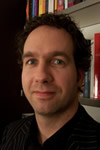Looking back at the ISAGA conference
Gaming is fun and involving and so was the ISAGA conference. The motto of this 5 day conference on gaming and simulation was 'learning by doing'. ISAGA 2007 was held from 9-13 July 2007 in Nijmegen - The Netherlands.
FIVE days?
I think it was great that it was a full week. This gives you the change to focus on the subject instead of your daily activities. And it gives you the opportunity to get a lot of insights and reflection moments.
Atmosphere?
With 200 participants it was a rather small conference (a slightly different than some of the Masie conferences I visited with 3500 participants). It was an informal gathering of game researchers, developers and players. Some were experienced in F2F simulations and games (what was called First Life during the conference), others only knew the digital counterparts (Second Life). It was an inspiring atmosphere with lots of experts. The limited number of people made it possible to have interactive sessions with room for discussion and participation.
Inspiring things?
Well, the level of the presenters was quite OK. Most of them were bringing a lot of enthusiasm and experience to the table. Especially the people who were not from my field (digital learning) offered me some new insights. Most things I saw where not new to me but they gave me some food for thought and I changed some of my views.
Top 5?
- Inspiring person: Albert Angehrn, this charismatic guy from CALT in France (http://www.calt.insead.edu/) told us in a very touching way about his experiences in simulation and gaming. Both offline and online they share a few things: they where putting participants in an involving experiences full of emotion and possibilities to get a taste of failure. Albert told us that he thinks failure is important for people to learn. His story about a simulation where a team of managers did a pitstop with a Ferrari formula 1 car made me want to join his team. It was not only a nice marketing concept but it had a very strong scientific base. A true visionair!
- Session with customer – a session with a real customer (www.nbc.nl) about a gaming question. Interesting to brainstorm with some other specialist on a specific topic. What was also interesting was the focus on design instead of analysis. The facilitator was pushing a bit to skip that phase. Nice outcome was that gaming was only a part of the solution and the advice was to put more effort in building an interactive community (within a virtual learning environment).
- Session on virtual worlds. Igor Mayer told about the experiences of the technical university of Delft with virtual worlds. He showed some examples of students who created content in Second Life and Active Worlds. In SL students imported a floating building (from a 3D graphic application) to start discussions about their design and in AW students played with a simulation of the restructuring of the railway area in Delft.
- Gert Jan Hofstede showed us why we play. In his session it becomes clear that playing is essential for living and it is in our genes for quite a long time. Interesting to put the motor behind game based learning in a historical, cultural and biological perspective. Play is not just for fun only; it has a function! It makes you as human happier and with playing you improve your skills.
- YY Cai from the Singapore Science Center showed us the cutting edge examples of virtual reality. He talked about the various input devices and he even used music in a totally new way (to explain biology subjects he synced music with structure of enzymes).
Some more?
Well besides the five sessions I went to a great explanation of Paul Maharg of the Law simulation 'Ardcalloch' (a 12 week intensive online simulation, an OSS tool to create this will be published: 'SIMPLE'), a session about a game design software tool ('CAGE' from an university of Finland) and I had a lot of nice discussions during diners and in between sessions.
Next year in Lithuanian!

No comments:
Post a Comment